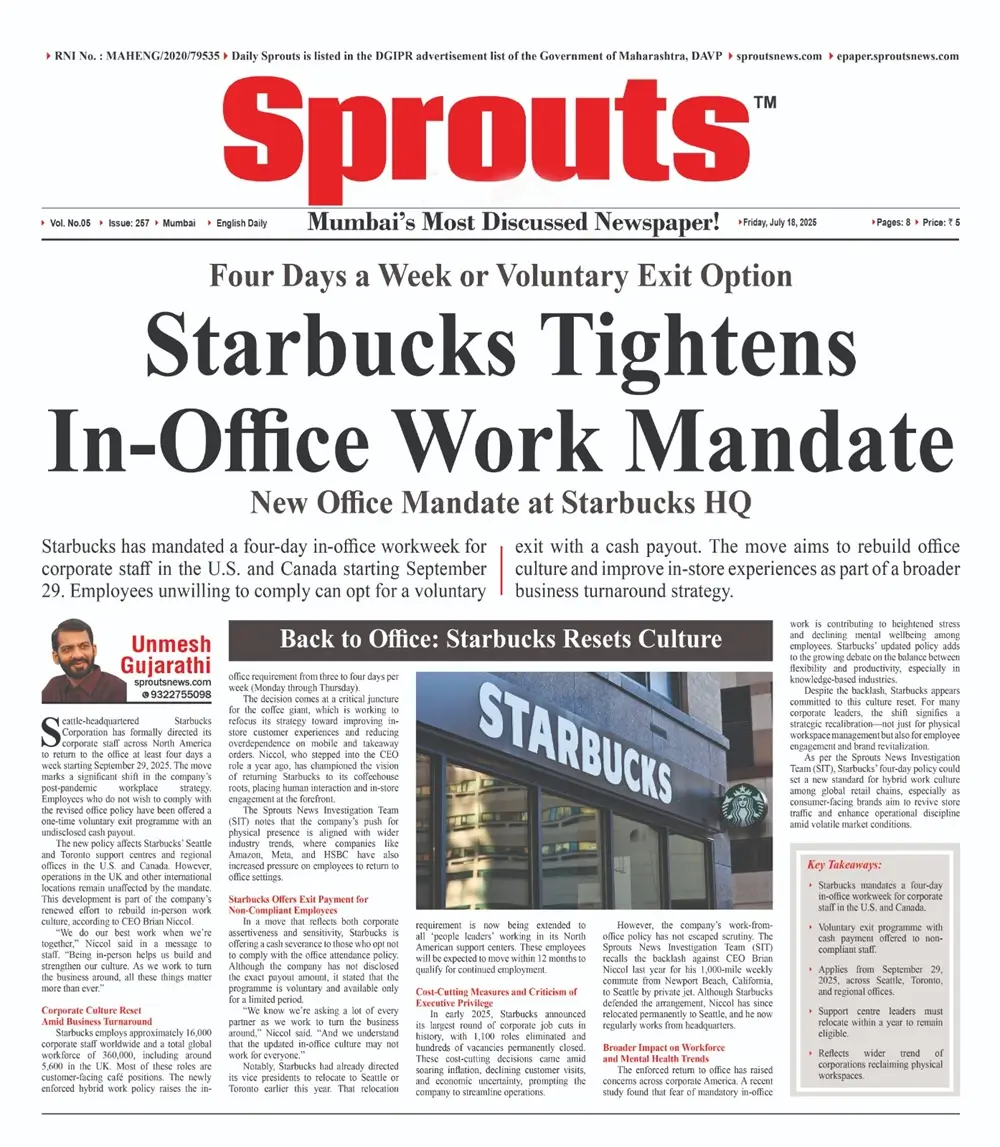Starbucks Tightens In-Office Work Mandate
• Four Days a Week or Voluntary Exit Option
• New Office Mandate at Starbucks HQ
• Back to Office: Starbucks Resets Culture
Unmesh Gujarathi
Sprouts News Exclusive
Contact: +91 9322755098
Sprouts News Exclusive
Contact: +91 9322755098
Starbucks has mandated a four-day in-office workweek for corporate staff in the U.S. and Canada starting September 29. Employees unwilling to comply can opt for a voluntary exit with a cash payout. The move aims to rebuild office culture and improve in-store experiences as part of a broader business turnaround strategy.
Seattle-headquartered Starbucks Corporation has formally directed its corporate staff across North America to return to the office at least four days a week starting September 29, 2025. The move marks a significant shift in the company’s post-pandemic workplace strategy. Employees who do not wish to comply with the revised office policy have been offered a one-time voluntary exit programme with an undisclosed cash payout.
Contents
- Starbucks Tightens In-Office Work Mandate
- • Four Days a Week or Voluntary Exit Option
- • New Office Mandate at Starbucks HQ
- • Back to Office: Starbucks Resets Culture
- Click Here To Download the News Attachment
- Corporate Culture Reset Amid Business Turnaround
- Starbucks Offers Exit Payment for Non-Compliant Employees
- Cost-Cutting Measures and Criticism of Executive Privilege
- Also Read: Delhi HC Slams Wipro Over Defamatory Firing Letter And Orders to Pay ₹2 Lakh.
- Broader Impact on Workforce and Mental Health Trends
The new policy affects Starbucks’ Seattle and Toronto support centres and regional offices in the U.S. and Canada. However, operations in the UK and other international locations remain unaffected by the mandate. This development is part of the company’s renewed effort to rebuild in-person work culture, according to CEO Brian Niccol.
“We do our best work when we’re together,” Niccol said in a message to staff. “Being in-person helps us build and strengthen our culture. As we work to turn the business around, all these things matter more than ever.”
Click Here To Download the News Attachment
Corporate Culture Reset Amid Business Turnaround
Starbucks employs approximately 16,000 corporate staff worldwide and a total global workforce of 360,000, including around 5,600 in the UK. Most of these roles are customer-facing café positions. The newly enforced hybrid work policy raises the in-office requirement from three to four days per week (Monday through Thursday).
The decision comes at a critical juncture for the coffee giant, which is working to refocus its strategy toward improving in-store customer experiences and reducing overdependence on mobile and takeaway orders. Niccol, who stepped into the CEO role a year ago, has championed the vision of returning Starbucks to its coffeehouse roots, placing human interaction and in-store engagement at the forefront.
The Sprouts News Investigation Team (SIT) notes that the company’s push for physical presence is aligned with wider industry trends, where companies like Amazon, Meta, and HSBC have also increased pressure on employees to return to office settings.
Starbucks Offers Exit Payment for Non-Compliant Employees
In a move that reflects both corporate assertiveness and sensitivity, Starbucks is offering a cash severance to those who opt not to comply with the office attendance policy. Although the company has not disclosed the exact payout amount, it stated that the programme is voluntary and available only for a limited period.
“We know we’re asking a lot of every partner as we work to turn the business around,” Niccol said. “And we understand that the updated in-office culture may not work for everyone.”
Notably, Starbucks had already directed its vice presidents to relocate to Seattle or Toronto earlier this year. That relocation requirement is now being extended to all ‘people leaders’ working in its North American support centers. These employees will be expected to move within 12 months to qualify for continued employment.
Cost-Cutting Measures and Criticism of Executive Privilege
In early 2025, Starbucks announced its largest round of corporate job cuts in history, with 1,100 roles eliminated and hundreds of vacancies permanently closed. These cost-cutting decisions came amid soaring inflation, declining customer visits, and economic uncertainty, prompting the company to streamline operations.
However, the company’s work-from-office policy has not escaped scrutiny. The Sprouts News Investigation Team (SIT) recalls the backlash against CEO Brian Niccol last year for his 1,000-mile weekly commute from Newport Beach, California, to Seattle by private jet. Although Starbucks defended the arrangement, Niccol has since relocated permanently to Seattle, and he now regularly works from headquarters.
Also Read: Delhi HC Slams Wipro Over Defamatory Firing Letter And Orders to Pay ₹2 Lakh.
Broader Impact on Workforce and Mental Health Trends
The enforced return to office has raised concerns across corporate America. A recent study found that fear of mandatory in-office work is contributing to heightened stress and declining mental wellbeing among employees. Starbucks’ updated policy adds to the growing debate on the balance between flexibility and productivity, especially in knowledge-based industries.
Despite the backlash, Starbucks appears committed to this culture reset. For many corporate leaders, the shift signifies a strategic recalibration—not just for physical workspace management but also for employee engagement and brand revitalization.
As per the Sprouts News Investigation Team (SIT), Starbucks’ four-day policy could set a new standard for hybrid work culture among global retail chains, especially as consumer-facing brands aim to revive store traffic and enhance operational discipline amid volatile market conditions.
Key Takeaways:
•Starbucks mandates a four-day in-office workweek for corporate staff in the U.S. and Canada.
•Voluntary exit programme with cash payment offered to non-compliant staff.
•Applies from September 29, 2025, across Seattle, Toronto, and regional offices.
•Support centre leaders must relocate within a year to remain eligible.
•Reflects wider trend of corporations reclaiming physical workspaces.


















